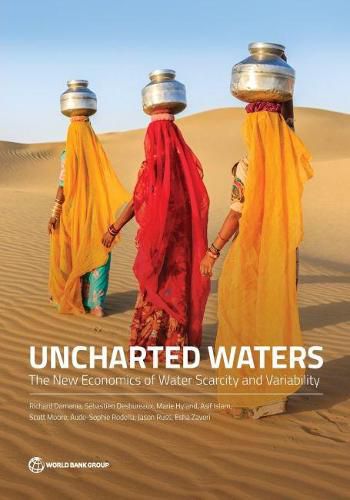Readings Newsletter
Become a Readings Member to make your shopping experience even easier.
Sign in or sign up for free!
You’re not far away from qualifying for FREE standard shipping within Australia
You’ve qualified for FREE standard shipping within Australia
The cart is loading…






The 21st century will witness the collision of two powerful forces - burgeoning population growth, together with a changing climate. With population growth, water scarcity will proliferate to new areas across the globe. And with climate change, rainfall will become more fickle, with longer and deeper periods of droughts and deluges.
This report presents new evidence to advance understanding on how rainfall shocks coupled with water scarcity, impacts farms, firms, and families. On farms, the largest consumers of water in the world, impacts are channeled from declining yields to changing landscapes. In cities, water extremes especially when combined with unreliable infrastructure can stall firm production, sales, and revenue. At the center of this are families, who feel the impacts of this uncertainty on their incomes, jobs, and long-term health and welfare. Although a rainfall shock may be fleeting, its consequences can become permanent and shape the destiny of those who experience it.
Pursuing business as usual will lead many countries down a ‘parched path’ where droughts shape destinies. Avoiding this misery in slow motion will call for fundamental changes to water policy around the globe. Building resilience to rainfall variability will require using different policy instruments to address the multifaceted nature of water. A key message of this report is that water has multiple economic attributes, each of which entail distinct policy responses. If water is not managed more prudently–from source, to tap, and back to source–the crises observed today will become the catastrophes of tomorrow.
$9.00 standard shipping within Australia
FREE standard shipping within Australia for orders over $100.00
Express & International shipping calculated at checkout
The 21st century will witness the collision of two powerful forces - burgeoning population growth, together with a changing climate. With population growth, water scarcity will proliferate to new areas across the globe. And with climate change, rainfall will become more fickle, with longer and deeper periods of droughts and deluges.
This report presents new evidence to advance understanding on how rainfall shocks coupled with water scarcity, impacts farms, firms, and families. On farms, the largest consumers of water in the world, impacts are channeled from declining yields to changing landscapes. In cities, water extremes especially when combined with unreliable infrastructure can stall firm production, sales, and revenue. At the center of this are families, who feel the impacts of this uncertainty on their incomes, jobs, and long-term health and welfare. Although a rainfall shock may be fleeting, its consequences can become permanent and shape the destiny of those who experience it.
Pursuing business as usual will lead many countries down a ‘parched path’ where droughts shape destinies. Avoiding this misery in slow motion will call for fundamental changes to water policy around the globe. Building resilience to rainfall variability will require using different policy instruments to address the multifaceted nature of water. A key message of this report is that water has multiple economic attributes, each of which entail distinct policy responses. If water is not managed more prudently–from source, to tap, and back to source–the crises observed today will become the catastrophes of tomorrow.